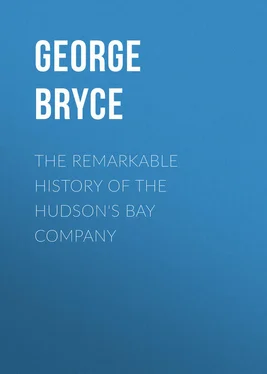George Bryce - The Remarkable History of the Hudson's Bay Company
Здесь есть возможность читать онлайн «George Bryce - The Remarkable History of the Hudson's Bay Company» — ознакомительный отрывок электронной книги совершенно бесплатно, а после прочтения отрывка купить полную версию. В некоторых случаях можно слушать аудио, скачать через торрент в формате fb2 и присутствует краткое содержание. Издательство: Иностранный паблик, Жанр: foreign_antique, foreign_prose, на английском языке. Описание произведения, (предисловие) а так же отзывы посетителей доступны на портале библиотеки ЛибКат.
- Название:The Remarkable History of the Hudson's Bay Company
- Автор:
- Издательство:Иностранный паблик
- Жанр:
- Год:неизвестен
- ISBN:нет данных
- Рейтинг книги:3 / 5. Голосов: 1
-
Избранное:Добавить в избранное
- Отзывы:
-
Ваша оценка:
- 60
- 1
- 2
- 3
- 4
- 5
The Remarkable History of the Hudson's Bay Company: краткое содержание, описание и аннотация
Предлагаем к чтению аннотацию, описание, краткое содержание или предисловие (зависит от того, что написал сам автор книги «The Remarkable History of the Hudson's Bay Company»). Если вы не нашли необходимую информацию о книге — напишите в комментариях, мы постараемся отыскать её.
The Remarkable History of the Hudson's Bay Company — читать онлайн ознакомительный отрывок
Ниже представлен текст книги, разбитый по страницам. Система сохранения места последней прочитанной страницы, позволяет с удобством читать онлайн бесплатно книгу «The Remarkable History of the Hudson's Bay Company», без необходимости каждый раз заново искать на чём Вы остановились. Поставьте закладку, и сможете в любой момент перейти на страницу, на которой закончили чтение.
Интервал:
Закладка:
The movement leading to the first voyage to Hudson Bay by Gillam and his company was carefully watched by the French Government. In February, 1668, at which time Gillam's expedition had not yet sailed, the Marquis de Denonville, Governor of Canada, appointed an officer to go in search of the most advantageous posts and occupy the shores of the Baie du Nord and the embouchures of the rivers that enter therein. Among other things the governor gave orders "to arrest especially the said Radisson and his adherents wherever they may be found."
Intendant Talon, in 1670, sent home word to M. Colbert that ships had been seen near Hudson Bay, and that it was likely that they were English, and were "under the guidance of a man des Grozeliers, formerly an inhabitant of Canada."
The alarm caused the French by the movements of the English adventurers was no doubt increased by the belief that Hudson Bay was included in French territory. The question of what constituted ownership or priority of claim was at this time a very difficult one among the nations. Whether mere discovery or temporary occupation could give the right of ownership was much questioned. Colonization would certainly be admitted to do so, provided there had been founded "certain establishments." But the claim of France upon Hudson Bay would appear to have been on the mere ground of the Hudson Bay region being contiguous or neighbouring territory to that held by the French.
The first claim made by France was under the commission, as Viceroy to Canada, given in 1540 by the French King to Sieur de Roberval, which no doubt covered the region about Hudson Bay, though not specifying it. In 1598 Lescarbot states that the commission given to De La Roche contained the following: "New France has for its boundaries on the west the Pacific Ocean within the Tropic of Cancer; on the south the islands of the Atlantic towards Cuba and Hispaniola; on the east, the Northern Sea which washes its shores, embracing in the north the land called Unknown toward the Frozen Sea, up to the Arctic Pole."
The sturdy common sense of Anglo-Saxon England refused to be bound by the contention that a region admittedly "Unknown" could be held on a mere formal claim.
The English pointed out that one of their expeditions under Henry Hudson in 1610 had actually discovered the Bay and given it its name; that Sir Thomas Button immediately thereafter had visited the west side of the Bay and given it the name of New Wales; that Captain James had, about a score of years after Hudson, gone to the part of the Bay which continued to bear his name, and that Captain Fox had in the same year reached the west side of the Bay. This claim of discovery was opposed to the fanciful claims made by France. The strength of the English contention, now enforced by actual occupation and the erection of Charles Fort, made it necessary to obtain some new basis of objection to the claim of England.
It is hard to resist the conclusion that a deliberate effort was made to invent some ground of prior discovery in order to meet the visible argument of a fort now occupied by the English. M. de la Potherie, historian of New France, made the assertion that Radisson and Groseilliers had crossed from Lake Superior to the Baie du Nord (Hudson Bay). It is true, as we have seen, that Oldmixon, the British writer of a generation or two later, states the same thing. This claim is, however, completely met by the statement made by Radisson of his third voyage that they heard only from the Indians on Lake Superior of the Northern Bay, but had not crossed to it by land. We have disposed of the matter of his fourth voyage. The same historian also puts forward what seems to be pure myth, that one Jean Bourdon, a Frenchman, entered the Bay in 1656 and engaged in trade. It was stated also that a priest, William Couture, sent by Governor D'Avaugour of New France, had in 1663 made a missionary establishment on the Bay. These are unconfirmed statements, having no details, and are suspicious in their time of origination. The Hudson's Bay Company's answer states that Bourdon's voyage was to another part of Canada, going only to 53° N., and not to the Bay at all. Though entirely unsupported, these claims were reiterated as late as 1857 by Hon. Joseph Cauchon in his case on behalf of Canada v. Hudson's Bay Company. M. Jeremie, who was Governor of the French forts in Hudson Bay in 1713, makes the statement that Radisson and Groseilliers had visited the Bay overland, for which there is no warrant, but the Governor does not speak of Bourdon or Couture. This contradiction of De la Potherie's claim is surely sufficient proof that there is no ground for credence of the stories, which are purely apocryphal. It is but just to state, however, that the original claim of Roberval and De la Roche had some weight in the negotiations which took place between the French and English Governments over this matter.
M. Colbert, the energetic Prime Minister of France, at any rate made up his mind that the English must be excluded from Hudson Bay. Furthermore, the fur trade of Canada was beginning to feel very decidedly the influence of the English traders in turning the trade to their factories on Hudson Bay. The French Prime Minister, in 1678, sent word to Duchesnau, the Intendant of Canada, to dispute the right of the English to erect factories on Hudson Bay. Radisson and Groseilliers, as we have seen, had before this time deserted the service of England and returned to that of France. With the approval of the French Government, these facile agents sailed to Canada and began the organization, in 1681, of a new association, to be known as "The Northern Company." Fitted out with two small barks, Le St. Pierre and La Ste. Anne , in 1682, the adventurers, with their companions, appeared before Charles Fort, which Groseilliers had helped to build, but do not seem to have made any hostile demonstration against it. Passing away to the west side of the Bay, these shrewd explorers entered the River Ste. Therese (the Hayes River of to-day) and there erected an establishment, which they called Fort Bourbon.
This was really one of the best trading points on the Bay. Some dispute as to even the occupancy of this point took place, but it would seem as if Radisson and Groseilliers had the priority of a few months over the English party that came to establish a fort at the mouth of the adjoining River Nelson. The two adventurers, Radisson and Groseilliers, in the following year came, as we have seen, with their ship-load of peltries to Canada, and it is charged that they attempted to unload a part of their cargo of furs before reaching Quebec. This led to a quarrel between them and the Northern Company, and the adroit fur traders again left the service of France to find their way back to England. We have already seen how completely these two Frenchmen, in the year 1684, took advantage of their own country at Fort Bourbon and turned over the furs to the Hudson's Bay Company.
The sense of injury produced on the minds of the French by the treachery of these adventurers stirred the authorities up to attack the posts in Hudson Bay. Governor Denonville now came heartily to the aid of the Northern Company, and commissioned Chevalier de Troyes to organize an overland expedition from Quebec to Hudson Bay. The love of adventure was strong in the breasts of the young French noblesse in Canada. Four brothers of the family Le Moyne had become known for their deeds of valour along the English frontier. Leader among the valorous French-Canadians was Le Moyne D'Iberville, who, though but twenty-four years of age, had already performed prodigies of daring. Maricourt, his brother, was another fiery spirit, who was known to the Iroquois by a name signifying "the little bird which is always in motion." Another leader was Ste. Helene. With a party of chosen men these intrepid spirits left the St. Lawrence in March, 1685, and threaded the streams of the Laurentian range to the shore of Hudson Bay.
Читать дальшеИнтервал:
Закладка:
Похожие книги на «The Remarkable History of the Hudson's Bay Company»
Представляем Вашему вниманию похожие книги на «The Remarkable History of the Hudson's Bay Company» списком для выбора. Мы отобрали схожую по названию и смыслу литературу в надежде предоставить читателям больше вариантов отыскать новые, интересные, ещё непрочитанные произведения.
Обсуждение, отзывы о книге «The Remarkable History of the Hudson's Bay Company» и просто собственные мнения читателей. Оставьте ваши комментарии, напишите, что Вы думаете о произведении, его смысле или главных героях. Укажите что конкретно понравилось, а что нет, и почему Вы так считаете.












